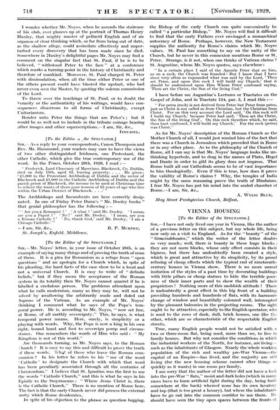[To the Editor of the SPECTATOR.] SIR, —Mr. Noyes' letter, in
your issue of October 26th, is an example of saying many things and of proving the truth of none of them. It is a plea for Romanism as a refuge from " open questions and an apologia for a Church which, in spite of his pleading, bite hard facts of the case show to be a local and not a universal Church. It is easy to write of " definite beliefs," but if they mean the acceptance of the Roman system in its totality then Mr. Noyes cannot quarrel if he is labelled a credulous person. The problems attendant upon
what he calls modernism, many as they may be, will not be solved by swallowing the arbitrarily made and doled out dogmas of the Vatican. As an example of Mr. Noyes' thinking I commend what he says of . the Pope's tem- poral power. He is, according to Mr. Noyes, " now set free, at Rome, of all earthly sovereignty." This, he says, is what temporal power means. Here, surely, is simplicity or a playing with words. Why, the Pope is now a king in his own right, bound hand and foot to sovereign pomp and circum- stance. One remembers the words of Him who said : " My Kingdom is not of this world."
Are thousands turning, as Mr. Noyes says, to the Roman 'hurch ? It is easy to say this and difficult to prove the truth
of these words. Wh54:, of :those who leave the Roman com-
munion ? In his letter he refers to his " use of the word Catholic ' to designate the Church with which that word has been peculiarly associated through all the centuries of Christendom." I believe that St. Ignatius was the first to use the words " Catholic Church," and this is what he says in his Epistle to the Smyrnaeans : " Where Jesus Christ is, there is the Catholic Church." There is no mention of Rome here. The fact is that the early Church never did possess the external unity which Rome desiderates.
In spite of his objection to the phrase as question begging, the Bishop of the early Church can quite conveniently be called " a particular Bishop."' Mr. Noyes will find it difficult to find that the early Fathers ever envisaged a monarchical autocracy of Rome. Perhaps, however, the New Testament supplies the authority for Rome's claims which Mr. Noyes values. St. Paul has something to say on the unity of the Church, but he never in this connexion mentions Rome or St. Peter. Strange, is it not, when one thinks of Vatican claims ? St. Augustine, whom Mr. Noyes quotes, says elsewhere:
" In a certain place I said of the Apostle Peter that on him, as on a rock, the Church was founded—But I know that I have since very often so expounded what was said by the Lord, Thou art Peter, and upon this rock I will build my Church,' that it should be understood upon Him Whom Peter confessed saying, `Thou art the Christ, the Son of the living God."
I have before me Augustine's Lectures or Tractates on the Gospel of John, and in Tractate 124, par. 5, I read this :—
" For petra (rock) is not derived from Peter but Peter from petra, just as Christ is not called so from Christian, but the Christian from Christ. For on this very account the Lord said, On this rock will I build my Church,' because Peter had said, Thou art the Christ, the Son of the living God'. On this rock therefore which, he said, thou haat confessed, I will build my Church.' For the rock (petra) was Christ."
As for Mr. Noyes' description of the Roman Church as the Mother Church of all, I would just remind him of the fact that there was a Church in Jerusalem which preceded that in Rome or in any other place. As to the philosophy of the Church of Rome, all I can say is that Mr. Noyes' language looks like un- thinking hyperbole, and to drag in the names of Plato, Hegel and Dante in order to gild its glory does not impress. That Rome built all our Cathedrals seems to be of vast importance to him theologically. Even if this is true, how does it prove the validity of Rome's claims ? Why, the temples of India might by the same reasoning prove the truth of Hinduism. I fear Mr. Noyes has put his mind into the sealed chamber of Rome.—I am, Sir, &c.,
A. WYLIE BLUE.
May Street Presbyterian Church, Belfast.








































 Previous page
Previous page